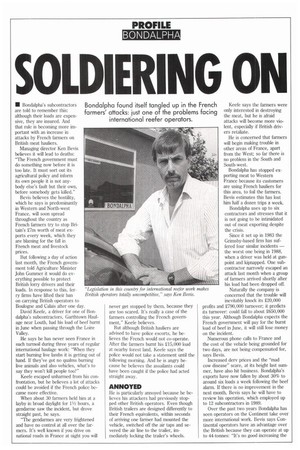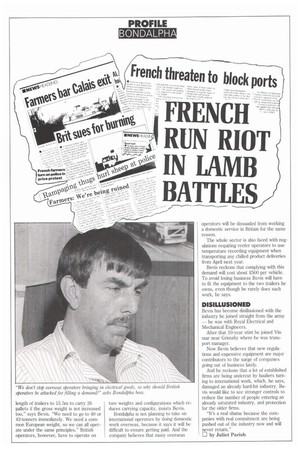SOLDIERING ON
Page 56

Page 58

If you've noticed an error in this article please click here to report it so we can fix it.
• Bondalpha's subcontractors are told to remember this: although their loads are expensive, they are insured. And that rule is becoming more important with an increase in attacks by French farmers on British meat hauliers.
Managing director Ken Bevis believes it will lead to deaths: "The French government must do something now before it is too late. It must sort out its agricultural policy and inform its own people it is not anybody else's fault but their own, before somebody gets killed."
Bevis believes the hostility, which he says is predominantly in Western and North-west France, will soon spread throughout the country as French farmers try to stop Britain's 27m worth of meat exports every week, which they are blaming for the fall in French meat and livestock prices.
But following a day of action last month, the French government told Agriculture Minister John Gummer it would do everything possible to protect British lorry drivers and their loads. In response to this, ferry firms have lifted their ban on carrying British operators to Boulogne and Calais after one day.
David Keefe, a driver for one of Bondalpha's subcontractors, Garthtown Haulage near Louth, had his load of beef burnt in June when passing through the Loire Valley.
He says he has never seen France in such turmoil during three years of regular international haulage work: "When they start burning live lambs it is getting out of hand. If they've got no qualms burning live animals and also vehicles, what's to say they won't kill people too?"
Keefe escaped unharmed from his confrontation, but he believes a lot of attacks could be avoided if the French police became more effective.
When about 30 farmers held him at a layby in broad daylight for 11/2 hours, a gendarme saw the incident, but drove straight past, he says.
"The gendarmes are very frightened and have no control at all over the farmers. It's well known if you drive on national roads in France at night you will never get stopped by them, because they are too scared. It's really a case of the farmers controlling the French government," Keefe believes.
But although British hauliers are advised to have police escorts, he believes the French would not co-operate. After the farmers burnt his 215,000 load at nearby forest land, Keefe says the police would not take a statement until the following morning. And he is angry because he believes the assailants could have been caught if the police had acted straight away.
ANNOYED
He is particularly annoyed because he believes his attackers had previously stopped other British operators. Even though British trailers are designed differently to their French equivalents, within seconds of arriving one farther had mounted the vehicle, switched off the air taps and severed the air line to the trailer, immediately locking the trailer's wheels. Keefe says the farmers were only interested in destroying the meat, but he is afraid attacks will become more violent, especially if British drivers retaliate.
He is concerned that farmers will begin making trouble in other areas of France, apart from the West; so far there is no problem in the South and South-west.
Bondalpha has stopped exporting meat to Western France because its customers are using French hauliers for this area, to foil the farmers. Bevis estimates this has lost him half a dozen trips a week.
Bondalpha uses up to six contractors and stresses that it is not going to be intimidated out of meat exporting despite the crisis.
Since it set up in 1983 the Grimsby-based firm has suffered four similar incidents — the worst one being in 1988, when a driver was held at gunpoint and kipnapped. One subcontractor narrowly escaped an attack last month when a group of farmers arrived shortly after his load had been dropped off.
Naturally the company is concerned that the trouble will inevitably knock its 220,000 profits and 2790,00(1 turnover: it predicts its turnover: could fall to about 2650,000 this year. Although Bondalpha expects the French government will pay for the burnt load of beef in June, it will still lose money on the incident.
Numerous phone calls to France and the cost of the vehicle being grounded for two days, are not being compensated for, says Bevis.
Increased dery prices and the "mad cow disease" scare, at its height last summer, have also hit business. Bondalpha's exports have now fallen by about 30% to around six loads a week following the beef alarm. If there is no improvement in the next month, Bevis says he will have to review his operation, which employed up to 12 subcontractors in 1989.
Over the past two years Bondalpha has seen operators on the Continent take over more international work. Bevis says Continental operators have an advantage over the British because they can operate at up to 44-tonnes: "It's no good increasing the length of trailers to 15.5m to carry 26 pallets if the gross weight is not increased too," says Bevis. "We need to go to 40 or 42-tonners immediately. We need a common European weight, so we can all operate under the same principles." British operators, however, have to operate on tare weights and configurations which reduces carrying capacity, insists Bevis.
Bondalpha is not planning to take on international operators by doing domestic work overseas, because it says it will be difficult to ensure getting paid. And the company believes that many overseas operators will be dissuaded from working a domestic service in Britain for the same reason.
The whole sector is also faced with regulations requiring reefer operators to use temperature recording equipment when transporting any chilled product deliveries from April next year.
Bevis reckons that complying with this demand will cost about £500 per vehicle. To avoid losing business Bevis will have to fit the equipment to the two trailers he owns, even though he rarely does such work, he says.
DISILLUSIONED
Bevis has become disillusioned with the industry he joined straight from the army — he was with Royal Electrical and Mechanical Engineers.
After that 10-year stint he joined Vinmar near Grimsby where he was transport manager.
Now Bevis believes that new regulations and expensive equipment are major contributors to the surge of companies going out of business lately.
And he reckons that a lot of established firms are being undercut by hauliers turning to international work, which, he says, damaged an already hard-hit industry. Bevis would like to see stronger controls to reduce the number of people entering an already saturated industry, and protection for the older firms.
"It's a real shame because the companies with real commitment are being pushed out of the industry now and will never return."
by Juliet Parish




































































































